PRINCETON, NJ -- As the two-week period of back-to-back presidential nominating conventions gets underway next Monday, an Aug. 20-22 USA Today/Gallup poll underscores the strengths and weaknesses of each of the two candidates at this point in the campaign. Barack Obama retains a significant edge over Mitt Romney on personal dimensions, particularly in terms of his "likability," while Americans still believe Romney is better able to handle the economy.
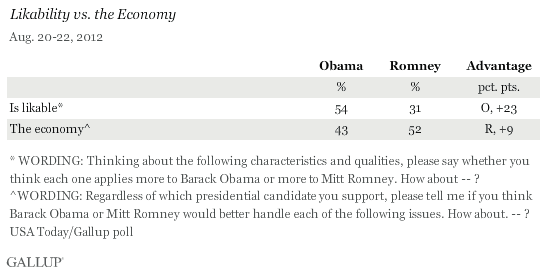
Americans are more likely to say that each of seven personal characteristics or qualities applies to Obama than to Romney, by margins stretching from one percentage point for "can manage the government effectively" to 23 points for being "likable."
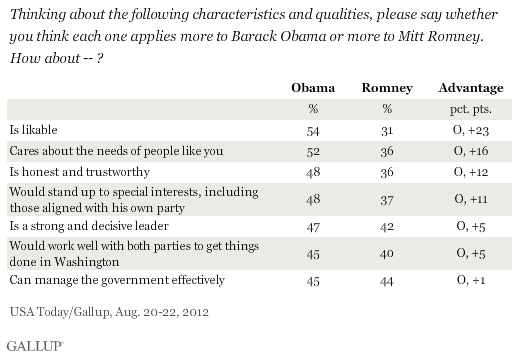
Obama has double-digit leads on four of the dimensions, including likability, cares about the needs of people like you, honesty, and "would stand up to special interests." Obama's lead is smaller in terms of being perceived as a strong and decisive leader, working well with both parties, and the aforementioned dimension of being able to manage the government effectively.
Gallup has measured the "likability" gap between Obama and Romney three times since May, and Obama's edge has narrowed during that time.
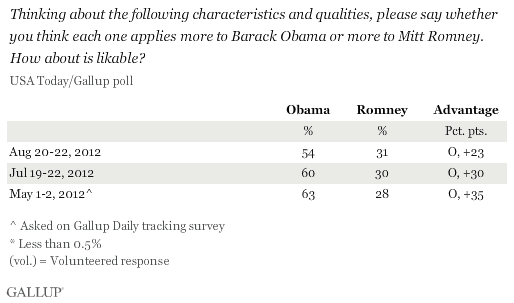
Additionally, Romney has gained on Obama in being perceived as "a strong and decisive leader," reducing Obama's lead on this dimension from 17 points when it was included in Gallup Daily tracking in May to five points today.
Romney Wins on Economy, Deficit; Obama on Other Five Issues Tested
Americans have widely differing views of the two candidates across the seven issue dimensions tested. Romney beats Obama on two economic issues, the federal budget deficit and the economy, while Obama wins by at least nine points on each of the other five -- including 12- to 14-point advantages on foreign affairs, energy, and Medicare.
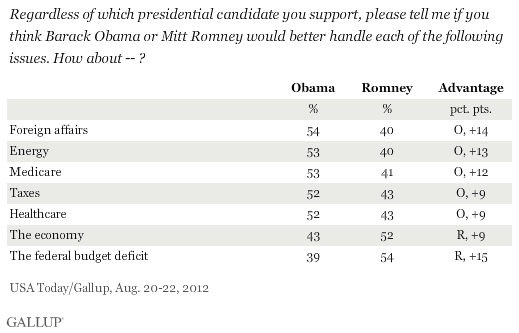
Gallup tested five of these issue dimensions in July, and since then Obama has gained significantly in his positioning versus Romney on taxes and on healthcare. Romney had a four-point advantage over Obama on taxes in July; now Obama is preferred on that dimension by nine points. Similarly, Obama has moved from a tie on healthcare in July to his current nine-point advantage.
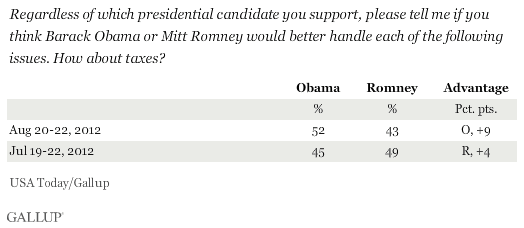
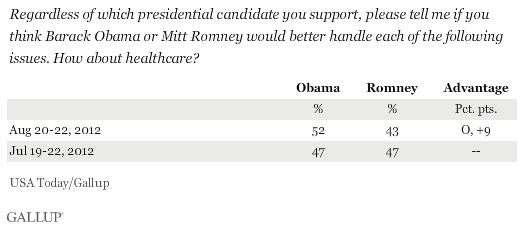
It is not precisely clear why Obama has gained on these issues. It is possible that Obama's continuing criticisms of Romney's proposed tax plans have seeped into the public's consciousness and affected its views of Romney on this issue. The Supreme Court decision affirming Obama's Affordable Care Act was released before the July survey, so it would not have affected the trends on healthcare.
Romney's strength on economic issues has not changed since July. It is clearly an important strength for him, given that Americans continue to identify the economy and jobs as the nation's most important problems and assign them the highest priority for the next president.
Romney's newly selected vice-presidential running mate, Paul Ryan, has spent much of his time in Congress focusing on the budget, the deficit, and Medicare. Still, a comparison of the positioning of Obama and Romney on handling the deficit between July and August shows that it has been Obama -- not Romney -- who has gained slightly (from a 19-point advantage for Romney to the current 15-point advantage) on this dimension. Gallup has not tested Medicare using this format previously, but Obama currently owns a 13-point advantage on this much-discussed issue.
Bottom Line
Overall, these data provide an illuminating insight into the structure of the presidential contest. President Obama's greatest vulnerability appears to be the economy -- not surprising, given that unemployment is still above 8% and given the low level of Americans' confidence in the economy. At the same time, Obama has great strengths in Americans' positive views of his personal image and characteristics, and of his position on several non-economic issues.
At this point, it appears that the two candidates' contrasting strengths have essentially canceled themselves out, given that Obama and Romney are exactly tied in Gallup Daily tracking. However, both candidates will have the opportunity to address their weaknesses and bolster their strengths in the forthcoming conventions.
Survey Methods
Results for this USA Today/Gallup poll are based on telephone interviews conducted Aug. 20-22, 2012, with a random sample of 1,033 adults, aged 18 and older, living in all 50 U.S. states and the District of Columbia.
For results based on the total sample of national adults, one can say with 95% confidence that the maximum margin of sampling error is ±4 percentage points.
Interviews are conducted with respondents on landline telephones and cellular phones, with interviews conducted in Spanish for respondents who are primarily Spanish-speaking. Each sample includes a minimum quota of 400 cell phone respondents and 600 landline respondents per 1,000 national adults, with additional minimum quotas among landline respondents by region. Landline telephone numbers are chosen at random among listed telephone numbers. Cell phone numbers are selected using random-digit-dial methods. Landline respondents are chosen at random within each household on the basis of which member had the most recent birthday.
Samples are weighted by gender, age, race, Hispanic ethnicity, education, region, adults in the household, and phone status (cell phone only/landline only/both, cell phone mostly, and having an unlisted landline number). Demographic weighting targets are based on the March 2011 Current Population Survey figures for the aged 18 and older non-institutionalized population living in U.S. telephone households. All reported margins of sampling error include the computed design effects for weighting and sample design.
In addition to sampling error, question wording and practical difficulties in conducting surveys can introduce error or bias into the findings of public opinion polls.
View methodology, full question results, and trend data.
For more details on Gallup's polling methodology, visit www.gallup.com.
